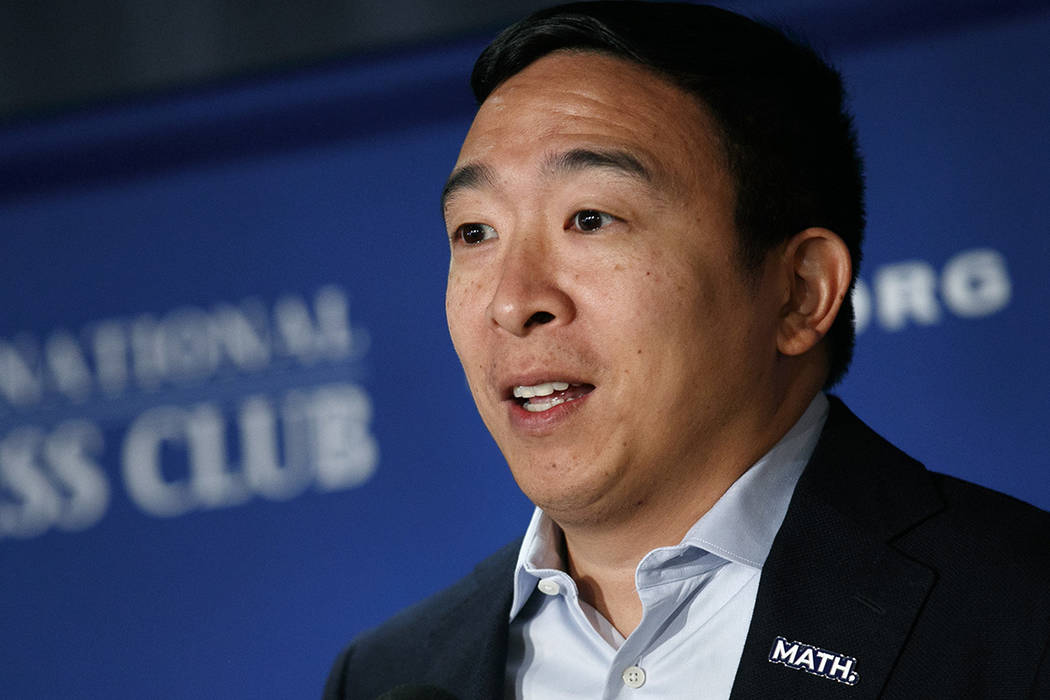Democratic candidate Andrew Yang: Our system is ‘grinding us up’

Democratic presidential candidate Andrew Yang believes the U.S. government has a fundamental flaw in how it judges economic success, and the consequences for failing to enact radical change could be felt hardest in Nevada.
In an interview with the Review-Journal during a weekend swing through Las Vegas, Yang said that while gross domestic product is at record highs, so too are stress, financial insecurity, student loan debt and drug abuse rates.
Life expectancy has dropped three years straight for the first time in a century. People born in the ’90s have a 50 percent chance of doing better in life than their parents, compared with 93 percent for those born in the ’40s.
“What I’m saying is the measurements are wrong,” Yang said. “That having our economy optimized for capital efficiency and productivity is killing us. It’s grinding us up.”
That’s where Yang’s flagship policy proposal — a “freedom dividend” that would pay every U.S. adult $1,000 per month until the day they die — comes in.
These payments would allow Americans to invest, pay off debts, go back to college or even just make ends meet, Yang said. It would allow for the nation’s economy to prioritize physical and mental health, the success of its children and freedom from substance abuse.
If GDP is the only measurement, Yang said, the automation of hospitality, manufacturing, trucking and other industries would appear to be a great thing.
“But what’s that going to mean for the people here in Las Vegas who work at that call center, who drive that truck or work at that UPS packing facility?” Yang said. “(Who) work in the casinos and retail establishments and hospitality businesses that are replacing people with kiosks, robot bartenders and self-serve stations?”
Yang said Nevada is No. 1 in the nation when looking at the proportion of jobs that could be lost to automation.
‘Cure the disease’
These uncertain economic times are, in part, what led to the rise of President Donald Trump in the first place, Yang said. And the entrepreneur said his more politically experienced opponents in the Democratic primary sometimes focus too much on simply removing Trump, who he called a “manifestation” of the country’s true problems.
“We have to actually get down to the roots and cure the disease — not only to beat Donald Trump in 2020, but also to move the country forward,” Yang said.
There is of course considerable skepticism of Yang’s plan and universal basic income in general. The cost would be considerable, and American capitalism has historically had an uneasy relationship with giving away something for nothing. It is perhaps the most radical idea put forward in a field that increasingly embraces liberal ideas once thought politically unthinkable, such as debt-and-tuition-free college, single-payer health care and mandatory assault weapon buybacks.
But Yang has remained undeterred.
The dividend would be funded primarily by small taxes on the millions of daily searches and transactions made on Google, Facebook, Amazon and other large tech companies making billions on such exchanges without being taxed on them, Yang said. Some developing countries use a similar system, he added.
Yang stressed that the U.S. government has fallen way too far behind in terms of moderating technology, and his freedom dividend is the only way to ensure Americans get a fair cut of the wealth. One of his favorite campaign one-liners quips that data is now worth more than oil, but no one is getting their data check in the mail.
“The people here in Nevada sense that (government has fallen behind the economy),” he said. “People around the country sense that. That’s one reason why when someone like Donald Trump ran, he won. And so, the question is whether we can start answering the problems that got him elected.”
He continued: “In 2016, Donald Trump said he was going to make America great again. And Hillary Clinton’s response was America’s already great. And that was not the right response.”
Yang said Americans can’t fall into the trap of thinking that simply removing Trump from office will solve their problems.
Ramping up in Nevada
The promise of $12,000 a year and Yang’s less notable policy positions have not yet been enough to vault him into a consistent top-five position in the polls, however . He only recently began to open offices and hire staff in Nevada, while some of the larger campaigns have been here since the spring and are approaching double-digit office openings or triple-digit staffing hires.
But Yang said his messaging has hit home in the Silver State, where he receives high engagement on ads and campaign emails. Americans are only just tuning into this election, Yang said, and his campaign is gaining momentum.
He pulled in $10 million in the last fundraising quarter — more than three sitting U.S. senators (Cory Booker, Amy Klobuchar and Michael Bennet) running against him. It can afford to keep up with the spending of his better funded opponents in early states, he added.
“The question is will we grow quickly enough to win in 2020?” Yang asked. “What I’m seeing is yes we will, because our growth has not been linear. Our growth is often exponential.”
Contact Rory Appleton at RAppleton@reviewjournal.com or 702-383-0276. Follow @RoryDoesPhonics on Twitter.